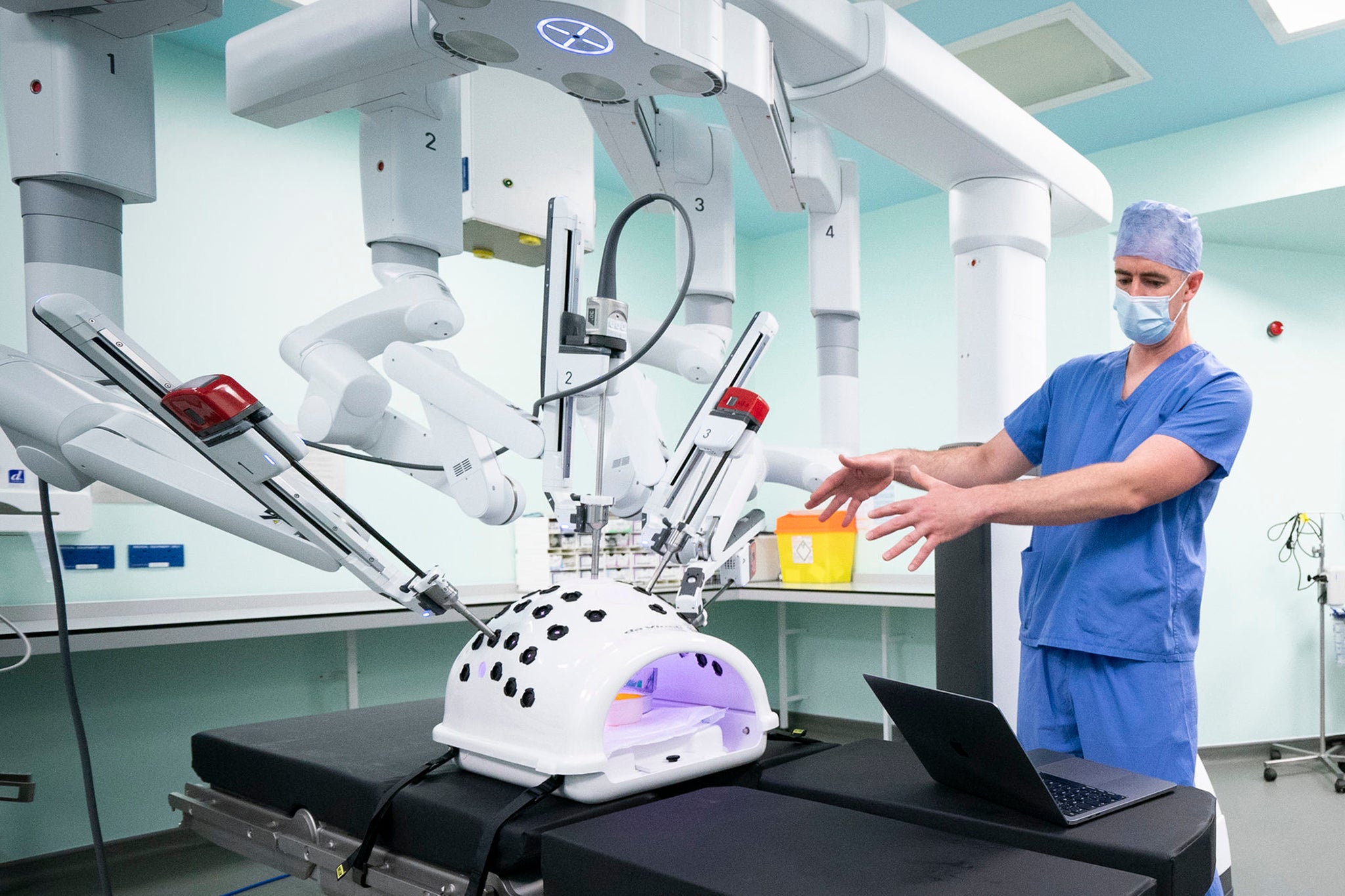It’s peak A-level season, but AI is stealing young people’s futures before they have even started
Graduate job listings have dropped by 17 per cent – a sign that AI is already gobbling up large parts of the job market, starting with entry-level jobs. As the first fully AI legal firm is approved, Zoë Beaty looks at the bleak landscape students are facing as the traditional career ladder is kicked away from them

The rituals unfold as they always have: hushed shuffling inside a stuffy exam hall, nervous energy silently bouncing off the walls; an impossibly loud clock, counting down to impending doom. This week, up and down the country, rows upon rows of students will sit hunched over their desks clutching “lucky” pens; praying that their hard work has been worth it. It is, of course, A-level season, which, done right, is supposedly the coveted, golden road to university, graduate jobs, money and a life lived right.
Yet, this year feels a little different.
Beyond the double doors of the sports hall, the world is changing at a rapid pace. While the next generation of workers study harder than ever, the qualifications they’ve been told hold the key to the next important step are suddenly in question: artificial intelligence (AI) isn’t only analysing data and producing basic graphic design, but diagnosing illnesses and drafting legal documents, too; today’s path, no matter how well they score, is muddied. This is a youth whose strange paradox means that the entry jobs and world they’re preparing for may no longer exist by the time they reach it.
For graduates, recent and future, it’s not exactly optimistic. There’s barely a corner of the job market left unaffected, and now even industries that were once considered safe – in medicine, or law, for example – are beginning to utilise AI and automation at the expense of human work.
This week, Business Insider reported new data that confirms that companies are hiring less, having found that, over the last three years, “the share of AI-doable tasks in online job postings has declined by 19 per cent”. The report continued to say that further analysis led to a “startling conclusion: the vast majority of the drop took place because companies are hiring fewer people in roles that AI can do” – and they are hitting junior, entry-level roles first.
This month, the first law firm providing legal services via AI was approved by the Solicitors Regulation Authority. While many firms are using AI to support and deliver a range of back-office and public-facing services, Garfield.Law Ltd will be the first purely AI-based company.
It is announcements like this that are causing enormous worry for a generation who are looking to get their first foot on a career ladder. “It means that the graduate job market has changed dramatically, in a very short period of time,” a careers consultant at a leading London university tells me. “AI is causing a huge amount of uncertainty and a lack of confidence, both on the side of the employers and the students and graduates.”
Where are you supposed to begin now, then? How do you navigate getting that first foot on the career ladder once the (promised) stepping stone has been whipped away?
“Even people who work in affected industries themselves aren’t sure,” she adds. “They know what the pipeline was back in their day, but now they really don’t know how this is all going to affect recruitment and, ultimately, career trajectories and the traditional ladder.”
We all know that AI is fundamentally warping the workplace as we know it – what experts are trying to work out now is exactly how, and how fast. According to reports from PwC, McKinsey, and the World Economic Forum, around 60 per cent of current jobs will require “significant adaptation due to AI” over the next 10-30 years or so; by then, AI will simply be another integrated part of our day jobs. Goldman Sachs goes one further: by 2045, their research finds, up to 50 per cent of jobs could be fully automated, and estimates that 300 million jobs will be affected by AI. Not even that A* in history can compete.

But while these projections feel far into the future, recent reports show that AI is already having a significant impact today. Already, there are a lot fewer opportunities, and according to the Financial Times, UK graduate job listings dropped from 7,000 in 2023 to 5,800 in 2024. That’s a drop of 17 per cent.
This means those on the market are more competitive than ever. In 2024, employers received an average of 140 applications per graduate vacancy, according to a report from Times Higher Education; a 59 per cent increase from the previous year and the highest number recorded since 1991.
“The anxiety in this cohort of students is off the scale,” explains futurist, author and Gen Z and Gen A expert Chloe Combi. “But this situation has revitalised a conversation about which subjects are necessary. Every kid that’s gone through exams and university in the last decade has been told ‘learn to code’, over and over again. But rapid progress suggests some of those high-employment computer science degrees might even become obsolete. In so many cases, there’s an AI programme that can do that in a micro proportion of the time it would take a human to do the jobs these kids have been told to aim for. It’s awful – and it’s not like they’ve been given or followed the wrong advice, far from it. They’ve just been given advice that’s become outdated in the blink of an eye.”
With white-collar, middle-class jobs now under more threat than ever, many are turning to more traditional blue-collar work – becoming an electrician, plumber, healthcare worker or hairdresser – sparking conversations about the power of the working class being revalued under this new industrial revolution.

Outside of trades, the advice is tentative but also reevaluates what is valuable. Investing in skills like critical thinking, strategic creativity, or very human traits like storytelling, negotiation and persuasion may now prove more lucrative than anything more traditional.
The expert itself, ChatGPT.com, has some ideas, too. “As AI like me becomes more integrated into the workplace, students need to adapt intelligently,” the tool explains, in its ever-creepy self-aware tone. “Don’t only aim for a specific job title – those may not exist in a few years,” is its first point. “Instead, study fields that build foundational thinking.”
Next, it advises to “combine technical and human insight” by, for example, taking a degree that blends fields, like philosophy and AI ethics, or computer science and psychology. Finally, back to the same point – don’t specialise in your career if you can help it; “be adaptable, not replaceable”, it warns, quite bleakly, and “learn how to work with AI, not compete against it”.
That black hole of uncertainty is only expanding.

“In the next 10 years, there’s going to be a very necessary transformation of the university system,” Combi says. “Unless you’re very privileged, I believe, a degree that’s learning for learning’s sake is going to become obsolete. Hopefully, there’ll also be a massive resurgence of apprenticeships, and hands-on apprenticeship degrees, which are a combination of the practical and theoretical.”
To be fair, this has been necessary for a long time. The promise of apprenticeships as a solid alternative to expensive degrees never really followed through – a combination of historical class bias, the stigma of “less prestigious” vocational qualifications and a lack of policy and funding has consistently held the idea back. But that could now all change.
For now, the quotes have been learned and the equations solved; the sleepless nights and frantic panics will soon be over for another year, and another generation of A-level students who lived to tell the tale. But though it might be unpredictable, they have an exciting road ahead: one that could be the perfect challenge for a digitally-fluent and adaptable Covid generation. If anyone can adapt, it will hopefully be them.
It won’t be until after they’ve picked up those long-awaited results in August that the real test will begin: not the one they just sat, but the one no one prepared them for.



Join our commenting forum
Join thought-provoking conversations, follow other Independent readers and see their replies
Comments